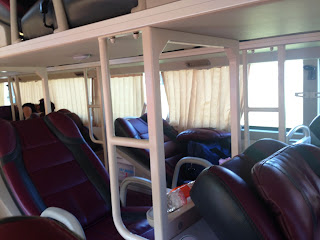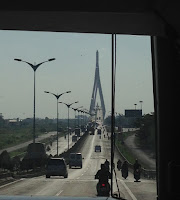 |
| On the way to Can Tho. |
Three thoughts describe my first day of 2016:
-I love motorbikes.
-Charades is more than just a party game.
-I have no idea how to navigate a Vietnamese bus terminal.
First, motorbikes. I love riding them. I love feeling the
wind kiss my face and neck. I love feeling the heat and noise of the city roll
away with each rev of the throttle.
A man I’ve never met, whose name I still do not know, parked
his tan motorbike outside of the Lan Lan Hotel 1 at 10:37 am on New Year’s Day.
I watched from the window of the lobby as he removed his helmet, tousled his jet
black hair, and tugged at his red and blue plaid shirt. He walked up the steps to
the hotel door and made eye contact through the glass. He pointed to me, Can
Tho? I nodded yes.
And that was that.
I climbed on the bike, one backpack went on the man’s lap,
the other on my back. Then we were off, weaving in and out of cars and other
cyclists, dodging pedestrians. The reports about the dangers of riding the
streets of Vietnam faded away and I beamed.
I love motorbikes.
The man deposited me at a small bus terminal 20 minutes away
and motioned me to one of the orange plastic seats. He went outside and lit a
cigarette. A mini-bus pulled up, he motioned me on. The guards turned me
away--not your bus. The man’s hand waved, go
sit down. Another bus arrived, the dance was repeated. Go sit down. Third bus, this was me. I piled in with the other
passengers; I looked out the window. The tan bike was already gone. I rode
another 30 minutes across the city to the main bus terminal.
As we pulled through the gates at 11:48 am, it dawned on me,
for the first time, that I had no idea how to find my bus.
There were 12 minutes until departure.
 |
| Destination: Can Tho. |
With packs strapped on both sides of my body, I wandered
toward the crowd surrounding half a dozen orange busses. I headed toward the
first person I saw, an older Vietnamese man, donned a big smile, held out my
ticket and asked, “Do you speak English?”
“Yes.” Relief.
But he had no idea where I was supposed to go. He turned to
the woman next to him; she looked at my ticket and pointed, “Go that way.”
I moved a hundred feet down the line and spotted a pair of
backpackers: I smiled, ticket extended, “Do you speak English?” Fingers pointed
further down the line, “I think you need to go that way.”
Next, a man in a uniform: smile, ticket extended. He points down
the line. Five minutes until departure.
I started showing my ticket to anyone who looked official. Or
knowledgeable. Or approachable. Or made eye contact. My smile was wavering.
A man in a tie stopped me and started to take my large backpack,
pointing to the luggage hold. This must be my bus. I could see nothing about
the giant orange vessel that indicated it was heading to Can Tho. But they let
me board. So I got on.
 |
| A sleeper bus. |
The bus was unlike anything I’d ever seen—a “sleeper” bus. All
passengers had to remove their shoes before boarding. Gripping my smaller backpack,
and grateful I’d decided to wear my blue and white ankle socks in the 90 degree
weather, I entered what looked like a bunkhouse. But instead of cots, there were
rows and rows of V-shaped, faux leather seats stacked on top of each other. I was
definitely too big to gracefully navigation the environment. I got on my hands
and knees and clumsily toppled into my assigned seat. I put my smaller backpack
between my legs and looked around to determine how I was supposed to sit.
 |
| View from my seat. |
My co-passengers were lounging, eyes closed. There was no
way I was sleeping. Looking out the window has always been my favorite part of
traveling. In order to see, though, I had to hold my back and neck at a 60
degree angle. I couldn’t sit all the way up or I’d hit my head. If I reclined
to the 45 degree angle of the seat, the sky and the bunk above me were the only
things visible.
We stopped an hour and a half later for a bathroom break. My
neck was killing me. No one spoke English, so I didn’t know how long the stop was
supposed to last. I just went as quickly as I could into the market-like rest
stop. I really wanted to look around at all of the wares (gorgeous fruits and vegetables,
strange pastries, Vietnamese fast food counters smelling of meat and fish). But
I was not going to miss my bus.
 |
| Tombs in fields (sorry, cell phone pic). |
If my calculations are correct, the stop lasted 24 minutes.
But the driver was anxious to leave after just 12 minutes—and he sent his assistant
into the terminal to start fetching passengers as he slowly crept the bus forward.
The next two hours I spent altering the hands were holding
up my neck. I endless saw farms and small towns pass by. It’s tradition to
build elaborate burial plots on the family land, so ancestors can remain at home.
Outside the window I saw countless tombs on the corners of each field, with
little family houses on opposite ends.
 |
| Bridge to Can Tho. |
Finally, the big suspension bridge that marks the entry to
Can Tho came into view. I was told by the ticket agent in Ho Chi Minh City that
a free bus would take me from the Can Tho terminal to my hotel. But again, as
we turned into the station, I realized I had no idea what the service was
called or how to find it. I had the address of my hotel written on a torn piece
of notebook paper and I clutched it as I was approached on both sides by taxi
drivers.
I awkwardly pushed past them and made my way through the
crowd to the main terminal office. I stopped and stared at all of the
passengers waiting. I put my shoulders back, plastered another smile on my face
and started showing everyone my crumpled little paper with the address on it. I
found my way to an agent who spoke some English. “Just wait there,” he said,
pointing to a seat.
 |
| The Mekong River, Can Tho. |
So I waited. My eyes never left the man as he walked back
and forth across the small station. At one point he became obsessed with an
extension cord. He followed it across the length of the room to find out where
it went. Then he followed it back to its origin. Then he moved the cord closer
to the wall, trying to keep people from stepping on it. He went behind his counter,
then leaned forward to check that the cord hadn’t moved. I started him down,
willing him to remember I was there waiting.
A woman came from my side and grabbed my arm, motioning me
outside. The man was still staring at the cord.
The woman ushered me into a gray mini-bus, crammed to the
max. An amazingly kind Vietnamese woman looked at my clutched paper and told
the driver where to take me. My smile came easily this time as I thanked her in
my cringe-worthy Vietnamese.
I’d made it. Day one of the new year, and I’d made it. I
hoped it was an omen for the rest of my year.
No comments:
Post a Comment